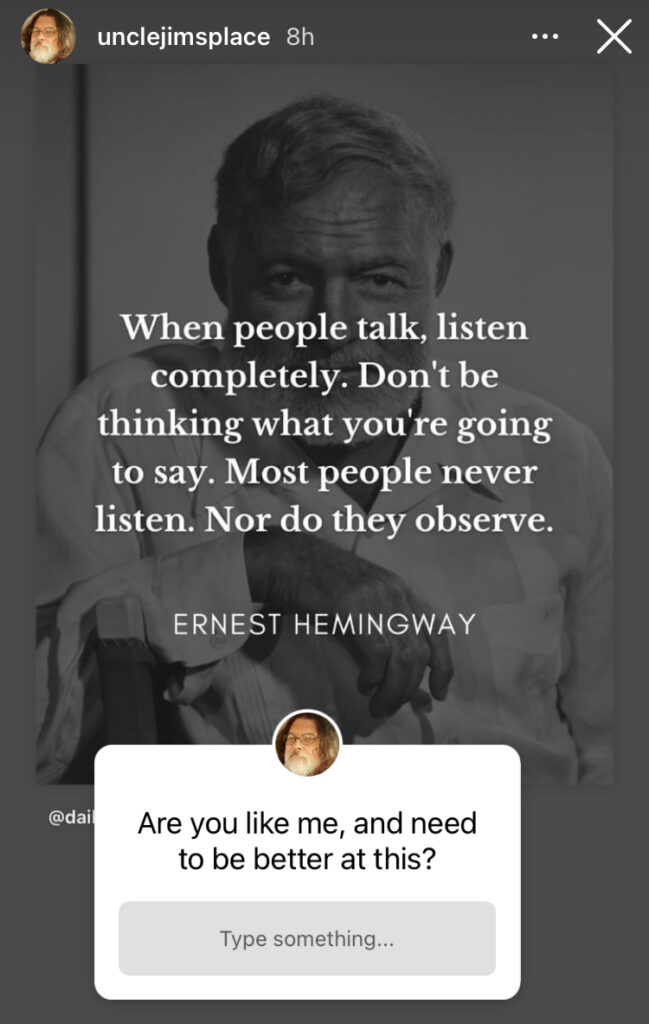
My friend Jim recently posted a Hemingway quote as an Instagram story and it caught my attention. The quote was, “When people talk, listen completely. Don’t be thinking what you’re going to say. Most people never listen. Nor do they observe.”
I’ve been in a lot of workshops and trainings that have involved listening activities that force you to listen to your conversation partner’s entire thought before you can respond. For example, your response has to start with the same word as their last word. Activities like these are good practice, but it’s so much harder in real life because the parameters of the activity aren’t there to make you listen to the end.
In his post, Jim asked, “Are you like me, and need to be better at this?” So I thought about it. And I responded to his question, basically saying, “personally, yes; professionally, no.” (I know, I know: we can always get better, but there’s a character limit on these things so give me a break.)
I said “professionally, no” because it’s something I’ve worked on a lot and have seen improvements over time. And I truly believe that remote work has enabled me to do it. I’ll explain.
When someone is talking in a virtual meeting, usually everyone else is muted or at least quiet, listening to the speaker. When someone interrupts (often unintentionally due to the speaker taking a long pause or there being a delay) it usually causes some sort of literal interruption to the flow of the meeting, and it’s annoying for everyone.
One of my biggest pet peeves during meetings is when someone virtually raises their hand and the speaker/presenter interrupts themselves to call on the hand-raiser mid-thought (this happens in-person and online, but I feel like it happens more online). I’ve noticed that when this happens, the hand-raiser often says something like, “Oh, I didn’t mean to interrupt, I just wanted to ask [insert question here].”
And I get it. You’re listening to a presentation and you have a question, so you raise your hand. The speaker certainly isn’t required to call on you immediately, and I’m sure that’s not your intention. But I strongly believe that the responsibility is shared: the speaker should only call on you when they finish their thought (or at the very least, their sentence!); and you should wait to raise your hand until there’s an appropriate pause. So often, the question is answered on the next slide anyway.
So here’s what I do:
As a participant, I keep a notepad on my desk (I’ve written about this notepad before). As questions come up while I listen to a presentation, I jot them down on my notepad. As they get answered during the presentation (which, inevitably, many do), I cross them off. When there’s a pause for questions or at the end, I raise my hand to ask any remaining questions.
As a speaker, if a participant raises their hand, I notice it silently, finish up what I have to say, and then either call on the participant or say that I’ll take questions in a moment or at the end of my talk. And I don’t even look at the chat until I’m done or pausing to give participants some time to process and think about whether they have questions. (How long to pause is a topic for another post.)
Of course, there are exceptions. Like, maybe you really need the speaker to clarify something in order to even follow along from that point on. Or, maybe the speaker is rambling, going off topic, or taking up too much time and someone needs to jump in and be a hero.
But for the most part, these strategies have worked well for me, and I hope are appreciated by speakers and participants alike! Do you have any strategies for listening completely?




